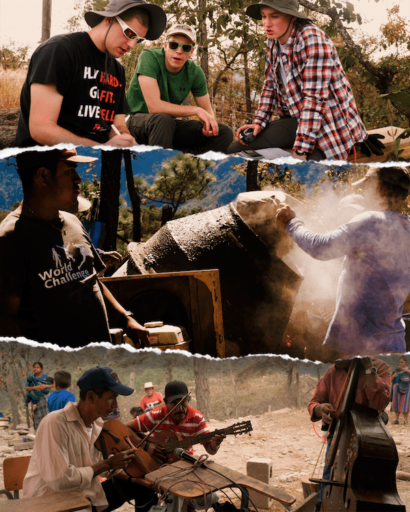In fall 2020, members of the University of Wisconsin-Madison Engineers Without Borders (EWB-UW) student chapter concluded a project that brought clean water to 130 homes in the rural community of Zapote, Guatemala. The system runs from a mountain spring and includes more than nine miles of piping largely buried in hand-dug trenches. Spanning five years and involving often backbreaking work on the parts of more than 100 students and local residents, it was the largest water distribution project ever undertaken by an EWB student chapter.
 Still frames from the documentary El Proyecto La Dignidad.
Still frames from the documentary El Proyecto La Dignidad.
Now, a full-length documentary film, El Proyecto La Dignidad, chronicles the UW-Madison student chapter’s strong and equal partnership with residents of Zapote as they together strove to solve the community’s water challenges. In addition to footage shot during the last stages of the project’s implementation in January 2020, the film contains interviews with more than 20 people associated with the effort, including Zapote community members and leaders; past and present EWB-UW members; parent organization EWB-USA staff; and representatives from Rotary International, which helped to fund the $120,000 system.
The film, which is hosted in collaboration with the Wisconsin Union Directorate Film Committee at UW-Madison, will be available for viewing from April 26-30, 2021, with a Q&A-style discussion on April 28 at 7 p.m. via Zoom with EWB-UW members, including president and civil and environmental engineering student Ryan Docter and Michael Brennan, a professional filmmaker who also is an undergraduate student in civil and environmental engineering. Links to view the film and join the discussion are available on the Wisconsin Union event calendar.
The idea for the documentary arose from a desire to increase awareness of the unique way in which EWB-UW student members collaborate with community residents to develop shared solutions, says Docter. “We were not the only ones who believed this project was a story worth sharing,” he says. “The community wanted to show what we student travelers already knew—that the Guatemalan people were resilient in the face of their water-related issues and wanted to take an active role in its solution. It was important during the film’s production that their stories, everyday struggles and realities prior to the completion of this project were heard, because this isn’t the only community in the region that shares their struggle for water.”
To that end, the film explores the history of Zapote and Guatemala, as well as Zapote’s journey from rural, unconnected society to a thriving community of neighbors. “We hope this film is able to portray the importance of an equal partnership between parties when working on international development projects like this,” says Docter. “The engineering design of a system of this scale is never easy, but we hope viewers will see that when cultures collaborate on something of this scale, mountains can quite literally be moved and the dignity of a rural Guatemalan community can be restored. This film is a reminder that all people, no matter their background or circumstances, are worthy of the most basic human right: clean potable water.”
View the film at: https://vimeo.com/541458568/2ac6278aab.
Read more about the project itself at https://engineering.wisc.edu/news/engineers-without-borders-brings-water-and-solar-to-people-in-need/.
View the film’s trailer on Facebook: https://www.facebook.com/watch/ewbuwguat/.